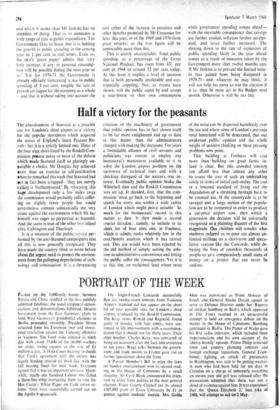Half a victory for the peasants
The abandonment of Stansted as a possible site for London's third airport is a victory for the popular movement which acquired the status of England's latest Peasant Re- volt: but it is a strictly limited one. Three of the four sites short-listed by the Roskill Com- mission possess many or most of the defects which made Stansted itself so glaringly un- suitable a choice. Mr Douglas Jay achieved pore than an exercise in self-justification when he remarked this week that Stansted had sot in fact been scrapped—'they are merely calling it Nuthampstead.' By relocating this huge development only a few miles away the commission would probably inflict suffer- ing on slightly fewer people but would nevertheless commit substantially the very crime against the environment which Mr Jay himself was eager to perpetrate at Stansted. And the same is true of the other two inland sites. Cublington and Thurleigh.
It is a measure of the public service per- formed by the anti-Stansted campaigners that all this is now generally recognised. They have made the country think as never before about the urgent need to protect the environ- ment from the galloping depredations of tech- nology and urbanisation. It is a devastating criticism of the machinery of government that public opinion has in fact shown itself to be far more enlightened and up to date in this matter than the administrators charged with making the decisions. For years a formidable alliance of civil servants and politicians was content to employ any bureaucrat's manoeuvre available to it to solve the London airport problem on the narrowest of technical lines and with a shocking disregard of the nation's true in- terest. Eventually public opinion broke the Whitehall dam and the Roskill Commission was set up. It decided, first, that the com- mission 'must go back to the beginning and search for every site within a wide radius of London which might prove suitable.' So much for the bureaucrats' record in this matter to date. It then made a second crucial decision : namely, to include in its short list of four sites one, at Foulness, which it admits ranks relatively low in the cost/benefit analysis which it has carried out. This site would have been rejected by the old method of simply suiting the solu- tion to administrative convenience and letting the public suffer the consequences. Yet it is to this site, on reclaimed land where most of the noise can be dispersed harmlessly over the sea and where none of London's precious rural hinterland will be desecrated, that our awakened public opinion and the whole weight of modern thinking on these pressing problems now point.
That building at Foulness will cost more than building on good farms in- land is clear. But this crowded country can afford less than almost any other to assess the cost of such an- undertaking solely in terms of initial cash outlay. The cost of a lowered standard of living and the degradation of a shrinking heritage have to be counted too. If the countryside is to be ravaged and a large section of the popula- tion are to be tormented in order to produce a cut-price airport now, then within a generation the decision will be universally recognised as a planning disaster of the first magnitude. Our children will wonder what madness induced us to pour out almost un- limited millions on a short-term and specu- lative venture like the Concorde, while de- basing the lives of countless thousands of people to save comparatively small sums of money on a project that can never be undone.


































 Previous page
Previous page